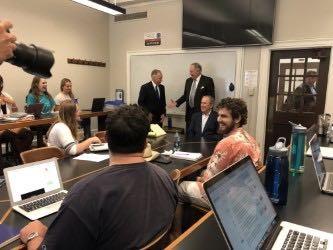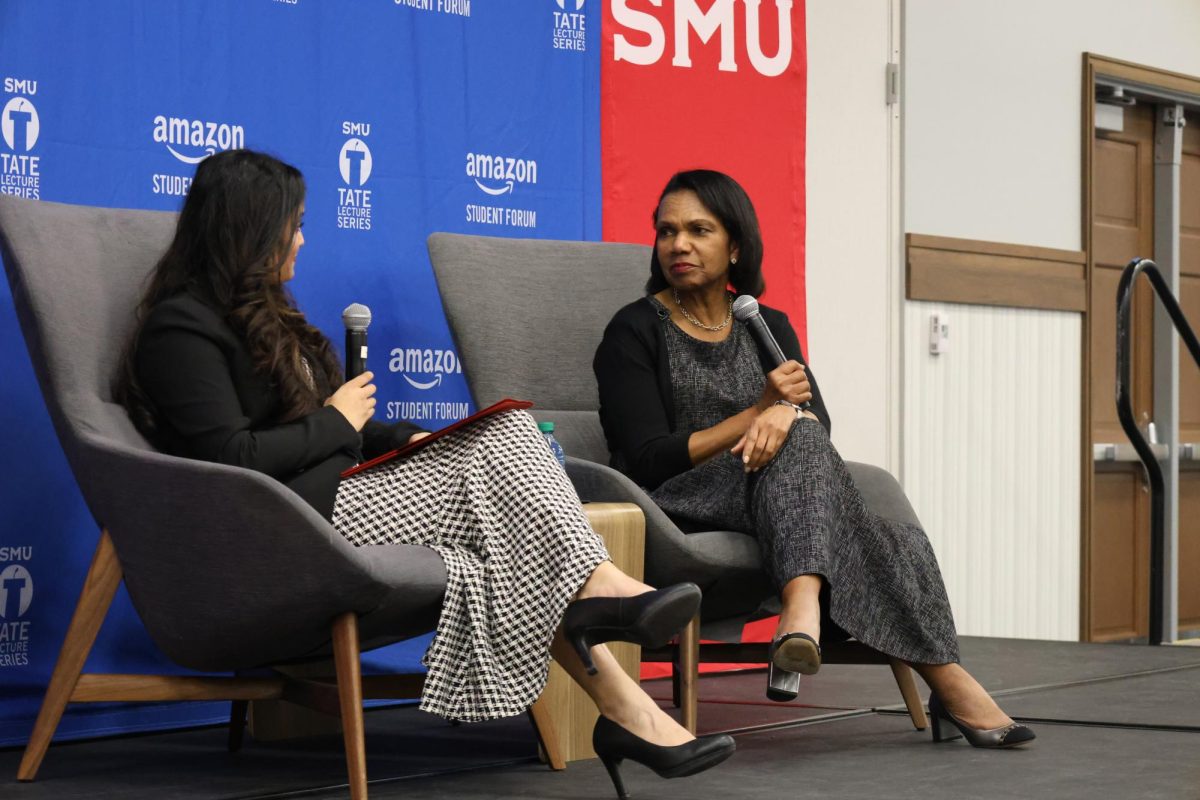When the President asks for your service, do you say yes? Even if it could cost you your life?
Robert Jordan, who would later become a professor at SMU, met George W. Bush long before the latter held the title of president. A lawyer, Jordan represented Bush during an SEC investigation into a stock trade.
Jordan said the young George Bush was very decisive and friendly, with a memorable sense of humor.
Young Bush was also impatient, and did not wish to spend time waiting for an investigation to proceed when he knew he had done nothing wrong. After about two years of debate, Jordan was able to convince the SEC of that as well. Soon after, Bush was elected as governor of Texas.
A relationship was born that would shape the life of Robert Jordan significantly.
While Bush held the title of governor, the business relationship grew to friendship. Jordan and his wife began taking trips to the governor’s mansion and to Texas Rangers baseball games with George and Laura Bush.
“We got to know each other really well during that period,” Jordan said.
When Bush was elected President, the friendship grew professional again as Bush turned to his old lawyer and offered him the position of foreign ambassador to Saudi Arabia.
Jordan, then 56, considered his decision for some time before his deciding advice came to him from his son.
“Dad, when the president asks you to do something, you do it.”
Jordan agreed and was set to become the ambassador to Saudi Arabia when everything changed. On Sept. 11, 2001, 15 of the 19 plane hijackers were Saudis. The relationship between Saudi Arabia and the United States was in a state of catastrophe.
Suddenly, Jordan’s future position became much more than he had bargained for. He knew with this change in foreign affairs, his job would now include investigating the cause of these attacks. His job would now be more dangerous, ask more of him, and, of course, be even more important than before.
Jordan’s friends encouraged him to change his mind.
“I had a lot of friends who said I should not go, and that noise got a lot louder after 9/11,” Jordan said. “Most of my friends said you really can’t do this.”
However, once Jordan had given his word, the decision was final. 9/11 might have changed the job, but he would not let it influence his decision. He was going to be the ambassador to Saudi Arabia, and no terrorist was going to show him otherwise.
“The heat was not a problem; being from Texas I’m used to the heat,” Jordan said of his transition to the Middle Eastern country.
Other aspects of the culture were not so familiar to him.
Once Jordan noticed that a Saudi was wearing elaborately decorated sandals. He complimented the sandals and then forgot about the interaction until the same pair was delivered to him as a gift the next day.
“That was fairly common behavior for the Saudis. I learned that pretty quickly,” Jordan said. “They are big gift givers.”
Not every change was positive.
“It was clearly a theocracy with no tolerance for other religions,” Jordan said. “Women’s roles are extremely minimized. All of that was something I had never experienced before.”
Years later when Jordan returned to the country with his wife, she experienced the sexism first hand. They stayed at the Rosewood Hotel in the city of Riyadh. She woke up one morning and chose to go on a Starbucks run. At the coffee shop, she was refused service in the “men’s” line and was forced to walk around back to the women’s. The women were not served until after all of the men.
“There’s just a lot of intolerance overall,” Jordan said.
The culture was not the only aspect of Jordan’s transition he felt troubling. The safety conditions in Saudi Arabia were not always standard for a U.S. Ambassador. Jordan was now followed everywhere by bodyguards.
“I’m not going to say I feared for my life, but I was definitely alert,” Jordan said. “My bodyguards made me more alert, they were always looking around every corner for security threats.”
When golfing, Jordan’s attention was no longer placed entirely on his game. He and his bodyguards now spent time looking over the hills and checking for snipers.
Jordan needed time to assimilate into the culture and settle, so his family did not join him immediately. His wife joined him in May 2002, but was only able to stay until May 2003.
On May 12, 2003 suicide bombings took place in Riyadh. Thirty-nine people were killed, and over 160 people were wounded. All dependents were forced to evacuate as the area was deemed unsafe for all nonessential personnel.
The bombings altered the safety measures needed for Jordan as well. He began sleeping in an undisclosed location every night, with two men carrying machine guns guarding the door.
Jordan was an important character in the investigations into 9/11, and in the relationship between the United States and Saudi Arabia during that time period. He cut through yards of red tape, worked through bureaucratic struggles and fought the hoarding of information. He had many successes throughout his years of service.
After returning to Dallas, Jordan was asked to join the Southern Methodist University Tower Scholars Board by Professor James Hollifield. He agreed, and about a year later he and Hollifield began discussing the possibility of Jordan teaching a course.
“He asked if I’d want to teach a course on the Middle East, and I said sure. That’s how we got here,” Jordan said.
Governments and Politics of the Middle East is now a political science class at SMU open to all students. Students at SMU speak very highly of the course.
“Ambassador Jordan’s class is my absolute favorite class that I’ve taken so far at SMU,” SMU student Katherine Jones said. “It’s a direct source, which is different than anything I’ve ever experienced before. Talk about credibility.”
Between the two jobs, Jordan said they are too different to say he prefers one more than the other.
“I’m glad I did the ambassador thing, and I’m glad it’s over,” Jordan said. “It was a unique period in time but it was also an exhausting experience.”















